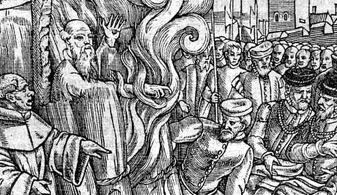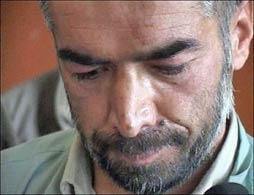New
This Week
Everything new is here.
News
News Centre
News archive

Basics
Start here
Anglicans believe...
The Prayer Book
The Bible
Letters
Read letters to AO
Write to us
Resources
Resources A to Z
World Anglicanism
Anglican Communion
In full communion
Not in the Communion
Dioceses
and Parishes
Africa
Australia
Canada
England
Europe
Ireland
Japan
New Zealand
Scotland
USA
Wales
World
Vacancies
Centre
List a vacancy
Check openings worldwide
Add a site
or link to AO
Add a site to AO
Link to AO
About Anglicans
Online
Back issues
Staff
Awards and publicity
Beginnings, AO
at 5
Sponsors
About our logo

|
|
Hallo
again to all.
 This year
21 March marked the 450th anniversary of the martyrdom of Thomas Cranmer,
Archbishop of Canterbury, architect of the Book of Common Prayer, diplomat,
husband, father and theologian. The anniversary was observed in Britain
and elsewhere as a religious milestone; it reminded us of our distance
in time from the reformation, the significant influence of the reformation
period in all Christian traditions still today, and of the jarring
notion that death was then and can still be the consequence of refusal
to deny conscientious religious opinions. (American Episcopalians commemorate
Cranmer along with Ridley and Latimer on 16 October.) In a
powerful and important sermon delivered this week, Cranmer's successor
Rowan Williams notes that the requirements of faith in the truth of the
incarnation ultimately led Cranmer to the chain of decisions that resulted
in his acceptance of a public death: This year
21 March marked the 450th anniversary of the martyrdom of Thomas Cranmer,
Archbishop of Canterbury, architect of the Book of Common Prayer, diplomat,
husband, father and theologian. The anniversary was observed in Britain
and elsewhere as a religious milestone; it reminded us of our distance
in time from the reformation, the significant influence of the reformation
period in all Christian traditions still today, and of the jarring
notion that death was then and can still be the consequence of refusal
to deny conscientious religious opinions. (American Episcopalians commemorate
Cranmer along with Ridley and Latimer on 16 October.) In a
powerful and important sermon delivered this week, Cranmer's successor
Rowan Williams notes that the requirements of faith in the truth of the
incarnation ultimately led Cranmer to the chain of decisions that resulted
in his acceptance of a public death:
It led
Cranmer — as it led so many others in that nightmare age, as it
led the martyrs of our own age, Bonhoeffer, Maria
Skobtsova, Janani Luwum
— to something more than a contemplative silence: to a real death.
When we say that the word of God is not bound, we say that death
itself can be the living speech of God, as the Word was uttered once
and for all in the silence at the end of Good Friday. Cranmer speaks,
not only in the controlled passion of those tight balances and repetitions
in his Prayer Book, but in that chilling final quarter of an hour.
He ran through the downpour to the town ditch and held out his right
hand, his writing hand, for a final composition, a final liturgy.
And, because the word of God is not bound, it is as if that hand
in the flames becomes an icon of the right hand of Majesty stretched
out to us for defence and mercy.
During the
past week we have watched with trepidation the flurry of news stories
about Afghan Christian Abdul Rahman, detained in Kabul and at this
writing still held on charges of conversion to Christianity. Afghan
law requires the execution of converts to Christianity from Islam,
and we have feared the likelihood that Abdul Rahman would be forced
into the same decision in 2006 that Cranmer made four and a half centuries
ago. His calm in the face of this possibility is a common thread in
every news report from The New York Times to Marianne and La
Repubblica.
The differences
between Cranmer's martyrdom and Abdul Rahman's arrest for conversion
from Islam are too many to enumerate fully here. Yet they are both
stark reminders of the costliness of Christian faith throughout much
of history and in many parts of the world. They are both inspiring stories
of the strength of a Christian's faith in adverse circumstances, and
saddening examples of suffering for our faith. Both cases also underscore
the extraordinary and oft-overlooked reality of complete religious freedom
in modern democratic societies. None of us can remember a time when
we knew legal or physical danger as a result of our baptism.
 Both the
BBC and the
Associated Press reported this afternoon that the court
set to hear Abdul Rahman's case had dismissed the charges against him,
and that he could be released from prison as early as Monday. Whilst
it is too early to give thanks for Abdul Rahman's exoneration and freedom,
we are already grateful that telecommunications have made it possible
for much of the world to speak with one voice in opposition to his
trial before it even began. Australia, Austria, Canada, the United States,
the Vatican, Germany, Italy and many other countries have gone on
almost immediate record to urge Abdul Rahman's fair treatment and release
in accord with international norms of religious freedom. Never before
have we seen an instance in which the body of Christ around the world
has known in real time about a trial so likely to lead to martyrdom,
or had the doctrine of the communion of saints been made so clear in
quite this way. As Abdul Rahman suffers, we all do; in his strength,
we are made stronger. In the event of his freedom, we pray, in the
Archbishop of Canterbury's words, for 'the right hand of Majesty stretched
out to him for defence and mercy' going forward. Both the
BBC and the
Associated Press reported this afternoon that the court
set to hear Abdul Rahman's case had dismissed the charges against him,
and that he could be released from prison as early as Monday. Whilst
it is too early to give thanks for Abdul Rahman's exoneration and freedom,
we are already grateful that telecommunications have made it possible
for much of the world to speak with one voice in opposition to his
trial before it even began. Australia, Austria, Canada, the United States,
the Vatican, Germany, Italy and many other countries have gone on
almost immediate record to urge Abdul Rahman's fair treatment and release
in accord with international norms of religious freedom. Never before
have we seen an instance in which the body of Christ around the world
has known in real time about a trial so likely to lead to martyrdom,
or had the doctrine of the communion of saints been made so clear in
quite this way. As Abdul Rahman suffers, we all do; in his strength,
we are made stronger. In the event of his freedom, we pray, in the
Archbishop of Canterbury's words, for 'the right hand of Majesty stretched
out to him for defence and mercy' going forward.
See you next
week.

All of us here at Anglicans Online
Last
updated: 26 March 2006
URL: http://anglicansonline.org
(Update on Cynthia's
cancer: some good news from her oncologist, but the chemotherapy
plods on and she is learning to live without hair.) |

